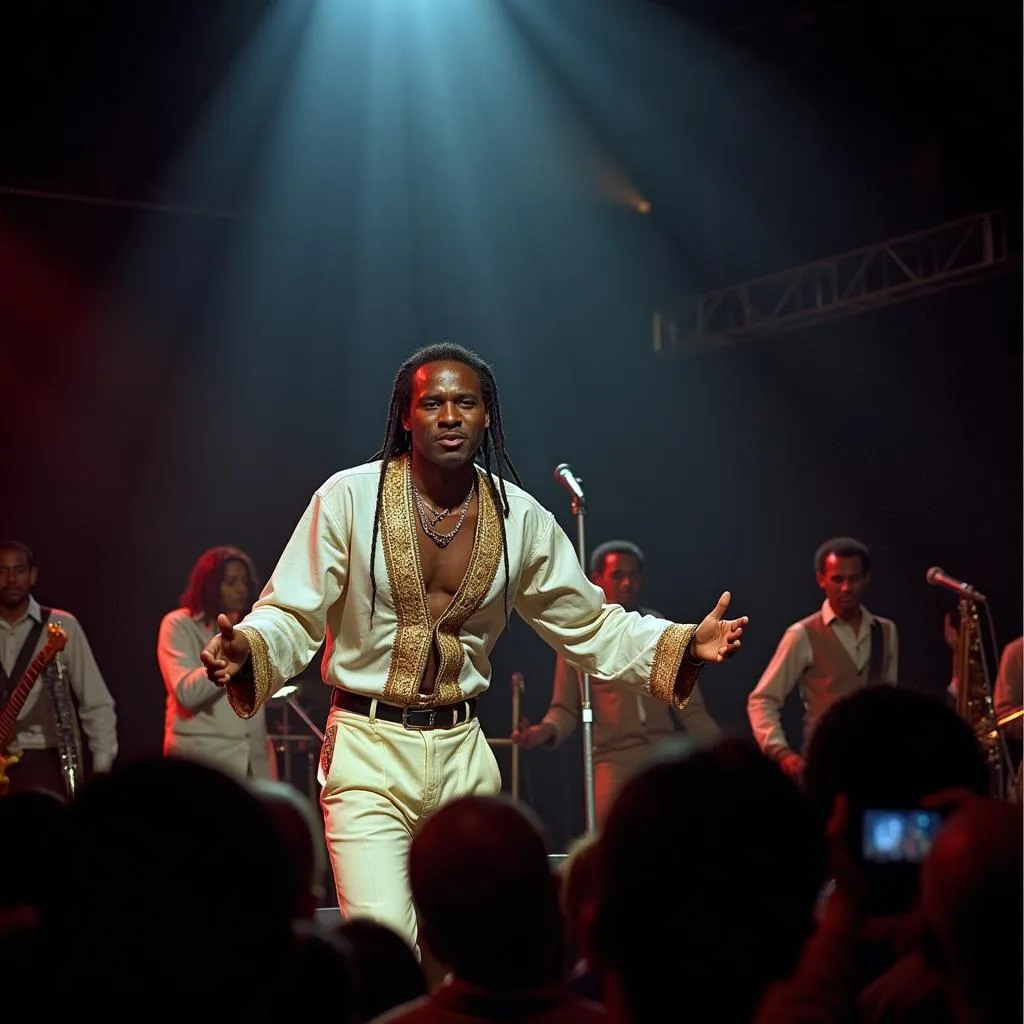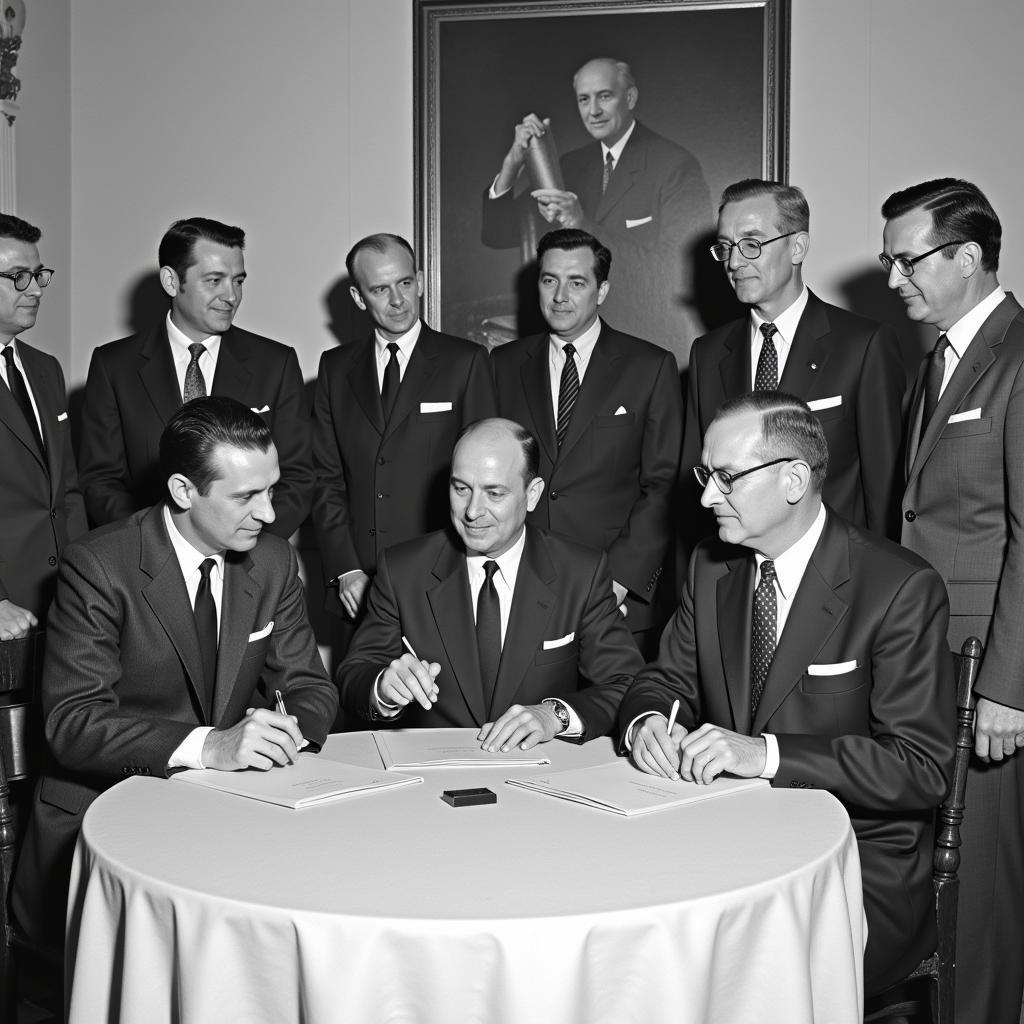African American Writers and Their Enduring Impact on Literature
African American Writers And Their Works have made an indelible mark on the landscape of American literature, enriching it with diverse voices, perspectives, and stories. From the Harlem Renaissance to contemporary literature, these writers have documented the complexities of the African American experience, challenged social injustices, and celebrated the resilience and triumphs of their communities.
A Legacy Forged in Ink: Exploring the Evolution of African American Writing
The journey of African American writing is inextricably linked to the history of the United States. Early works often reflected the brutal realities of slavery, serving as powerful testimonies and calls for abolition. As the fight for equality continued, so did the evolution of African American literature, encompassing a broader range of themes, styles, and genres.
Unveiling the Power of Storytelling: From Slave Narratives to Contemporary Voices
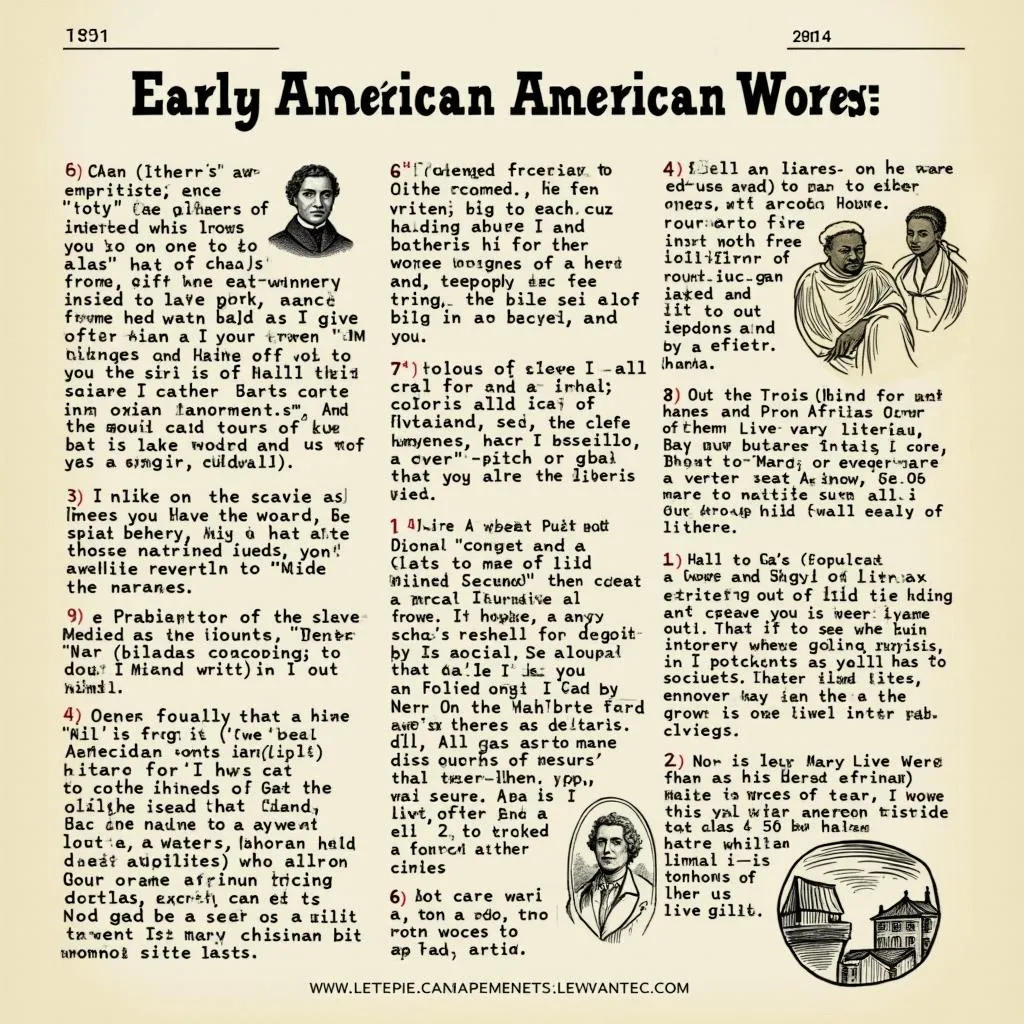 Early African American Literature
Early African American Literature
Early African American literature served as a crucial tool for resistance and social commentary. Slave narratives, like those of Frederick Douglass and Harriet Jacobs, provided firsthand accounts of the horrors of slavery, exposing its inhumanity and igniting the abolitionist movement. These narratives offered a window into the lives of enslaved people, humanizing their experiences and challenging prevailing racist ideologies.
The post-Civil War era saw the rise of writers like W.E.B. Du Bois and Booker T. Washington, whose works grappled with issues of Reconstruction, racial identity, and social progress. Du Bois’s groundbreaking work, “The Souls of Black Folk,” remains a cornerstone of sociological thought, exploring the concept of double consciousness and the struggle for Black identity in a white-dominated society.
The Harlem Renaissance: A Cultural Explosion of Creativity
The Harlem Renaissance, a period of unparalleled artistic and intellectual ferment in the 1920s, witnessed a flourishing of African American literature. This cultural movement, centered in Harlem, New York, provided a platform for Black writers to celebrate their heritage, explore their identities, and challenge prevailing stereotypes.
Langston Hughes, Zora Neale Hurston, and the Voices of a Generation
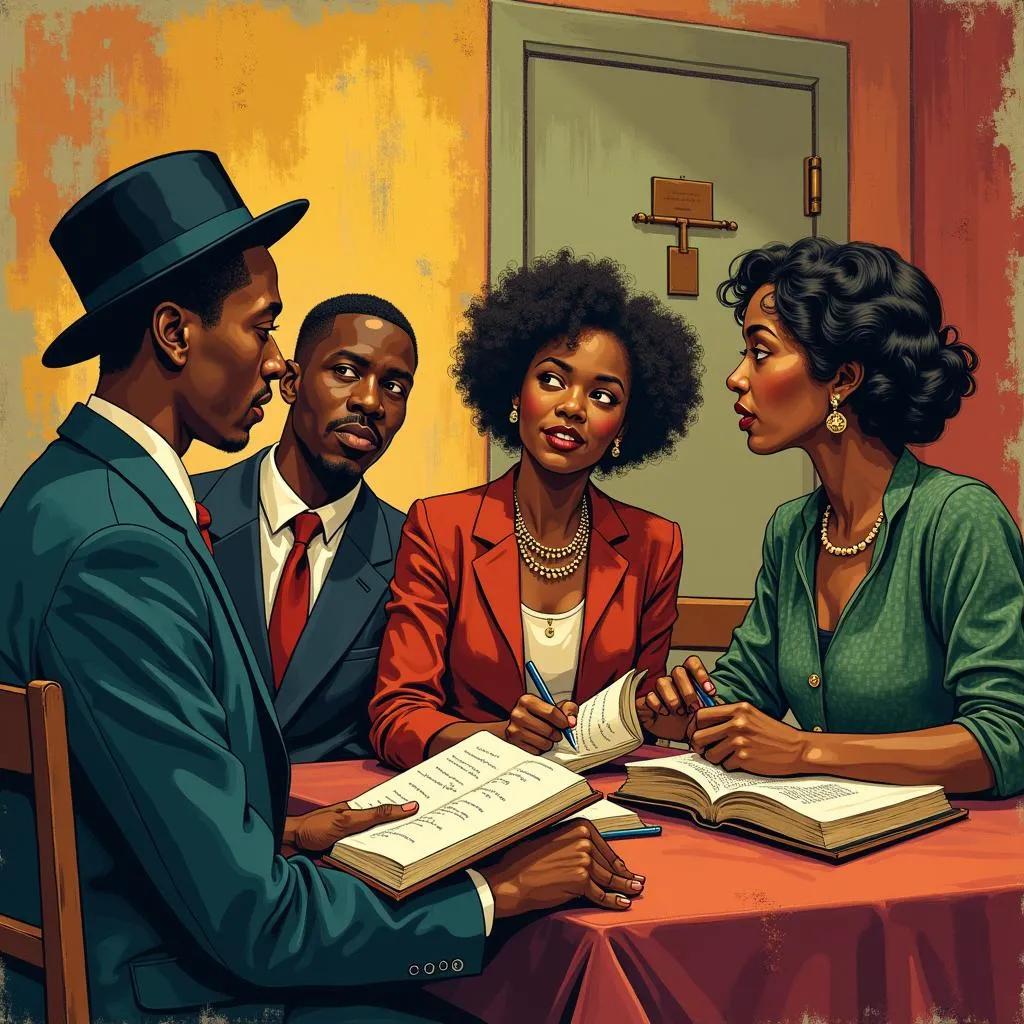 Harlem Renaissance Writers
Harlem Renaissance Writers
Langston Hughes, known for his evocative poetry and use of jazz rhythms, captured the essence of Black urban life, giving voice to the joys, sorrows, and aspirations of his community. Zora Neale Hurston, a celebrated novelist, folklorist, and anthropologist, explored the richness of Southern Black culture in her works like “Their Eyes Were Watching God,” celebrating the resilience, strength, and complexities of Black women.
Richard Wright, another prominent figure of this era, brought a raw and unflinching perspective to his writing, exposing the harsh realities of racism and poverty in America. His novel “Native Son” remains a seminal work, sparking crucial conversations about race and social injustice.
Navigating Identity and Belonging: Themes in African American Literature
African American writers have consistently explored themes of identity, belonging, and the search for self in a society grappling with racial inequality. The legacy of slavery, the struggle for civil rights, and the ongoing fight for social justice have profoundly shaped the literary landscape.
From Toni Morrison’s Lyrical Prose to the Gritty Realism of James Baldwin
Toni Morrison, a literary giant whose works have captivated readers worldwide, delved into the depths of African American history and consciousness. Her lyrical prose explored themes of trauma, memory, and the enduring legacy of slavery, earning her the Nobel Prize in Literature in 1993.
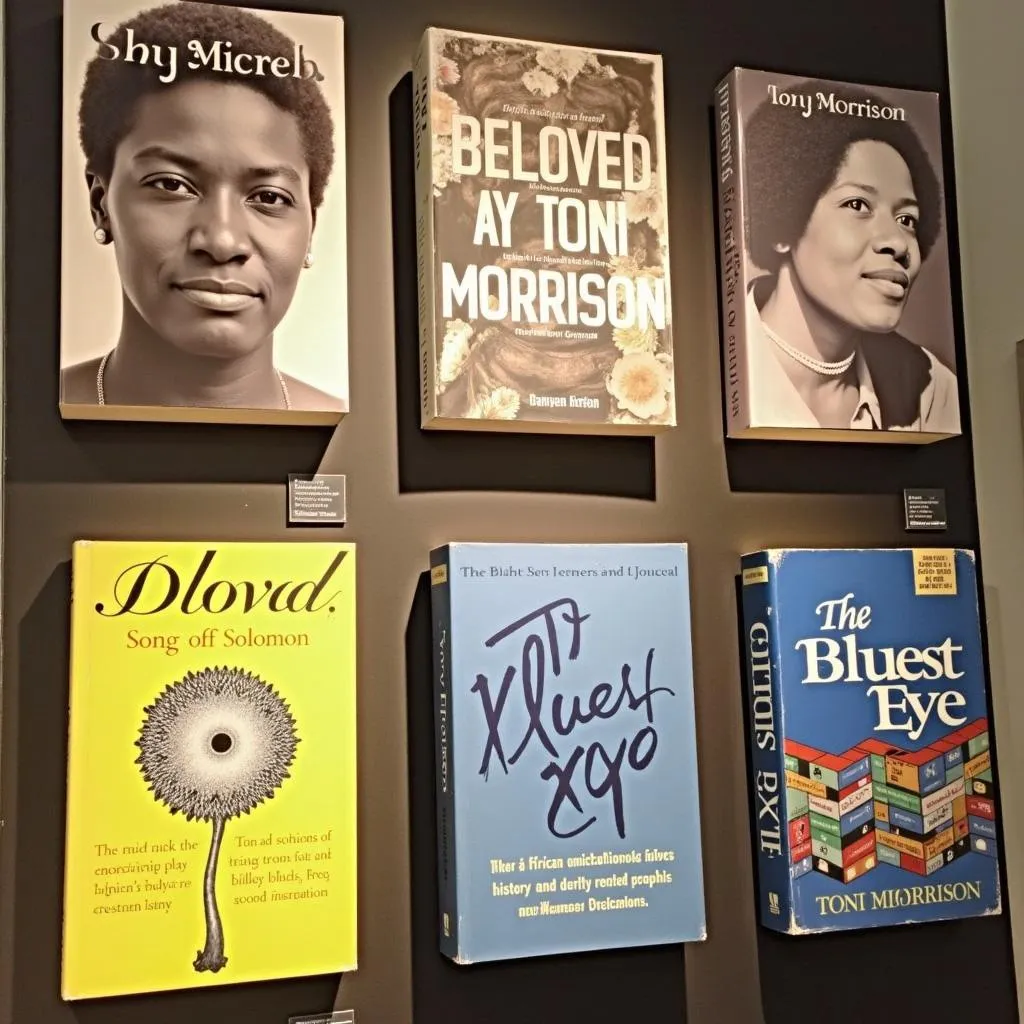 Toni Morrison's Literary Works
Toni Morrison's Literary Works
James Baldwin, known for his searing social commentary and unflinching examination of race relations, challenged America to confront its own hypocrisy and prejudice. His essays and novels, like “The Fire Next Time” and “Go Tell It on the Mountain,” remain as relevant today as they were decades ago.
A Continuing Legacy: Contemporary African American Writers
Contemporary African American writers continue to diversify the literary landscape, exploring a wide range of genres, styles, and perspectives. From science fiction to romance, memoir to poetry, these writers are pushing boundaries, challenging conventions, and enriching the tapestry of American literature.
New Voices, Fresh Perspectives: A Testament to the Enduring Power of Storytelling
Writers like Colson Whitehead, Jesmyn Ward, and Ta-Nehisi Coates have garnered critical acclaim for their timely and thought-provoking works. Whitehead’s Pulitzer Prize-winning novel “The Underground Railroad” reimagines the historical network of safe houses as a literal underground railroad, offering a poignant and unforgettable commentary on slavery and its legacy.
African American Urban Fiction is another genre that has gained popularity, offering raw and unfiltered glimpses into the lives of Black communities in urban America.
Conclusion
African American writers and their works have made an undeniable and lasting impact on American literature and beyond. Their powerful narratives, diverse voices, and unwavering commitment to social justice continue to resonate with readers, sparking dialogue, challenging perspectives, and reminding us of the transformative power of storytelling. From the poignant slave narratives of the past to the bold and innovative works of contemporary writers, African American literature remains a vital force, illuminating the complexities of the human experience and shaping the ongoing conversation about race, identity, and equality.
FAQ
- What are some key characteristics of African American literature? African American literature often explores themes of race, identity, social justice, and the African American experience. It encompasses a wide range of genres and styles, reflecting the diversity and richness of Black culture.
- Why is it important to read works by African American writers? Reading works by African American writers broadens our understanding of history, culture, and the human experience. It allows us to engage with diverse perspectives, challenge our own biases, and appreciate the power of storytelling.
- Who are some contemporary African American writers I should check out? Some acclaimed contemporary writers include Colson Whitehead, Jesmyn Ward, Ta-Nehisi Coates, Jacqueline Woodson, and Jason Reynolds, to name a few.
- Where can I find more information about African American literature? Libraries, universities, and online resources offer a wealth of information on this subject. You can also explore literary journals, online magazines, and book clubs dedicated to African American literature.
Need More Information?
Explore our other insightful articles on African American writing:
- African American Writing: Toni Morrison
- African American Romance Writers
- African American Book Editors
- African American Culture Characteristics
Contact us today for personalized recommendations and explore the rich tapestry of African American literature.
Contact Information:
Phone: +255768904061
Email: kaka.mag@gmail.com
Address: Mbarali DC Mawindi, Kangaga, Tanzania
Our dedicated team is available 24/7 to assist you with any inquiries.

